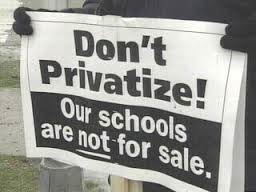
We all have private interests.
People pursuing their private interests – individually or as a group – is what drives progress and innovation. But our private interests should never trump the common good.
Private interests usurping the public good is privatization. Privatization is bad. It undermines democracy and progress.
Encouraging the pursuit of private interests while avoiding privatization is a core challenge for our economic and political democracy. In pursuing their private interests, individuals and organizations often claim their interests promote the common good, while the interests of those they disagree with don’t. Politics derives, in part, from conflicting claims of whose private interests better align with the common good.
We see this regularly in our debates over how best to improve public education.
As a long-time teacher union leader, I sold financial services, insurance and advocacy services to teachers working for school districts. Therefore, maximizing the number of teachers employed by school districts served my business interests. Our union continuously asserted that more teachers working for school districts served the common good, as did higher teacher salaries and benefits. Our favorite marketing slogan was, “Teachers’ working conditions are students’ learning conditions.”
Our union’s political and marketing strategy was to tie the private interests of district teachers to a greater common good (i.e., the welfare of children). Of course, the private interests of teachers are often – but not always – tied to children’s interest, so this was, and still is, an effective strategy.
Teacher unions use a similar political strategy when attacking school choice programs that empower students and teachers to attend schools not covered by union contracts. The unions accuse these schools of furthering privatization. As the National Education Association recently stated about charter schools not under union contracts: “We oppose the creation of charter schools for the purpose of privatization.”
Teacher unions are often criticized – unfairly in my opinion – for advocating for the private interests of district teachers.
A California political activist recently asked me why it was okay for the California teacher union to save the teaching jobs of pedophiles. I explained that teachers pay unions to advocate for their interests. If the union prevails in a situation that undermines the common good, it’s not the union’s fault. It’s the system’s fault. Just as we shouldn’t blame a defense attorney for convincing a judge or jury to acquit a defendant the defense attorney knows is guilty, we shouldn’t blame a teacher union for saving the job of an incompetent or immoral teacher.
This activist responded by saying the California teachers union has so much money from mandatory union dues that it’s able to control the political system responsible for protecting the public from privatization. And this is why the private interests of California teachers so often trump the interests of children and the public. I don’t know enough about California politics to know if this is true, but I do know political contributions often cause our elected officials to allow some privatization to occur.
The excessive deregulation of the finance industry which allowed the financial corruption that exacerbated the Great Recession was caused, in part, by the undue political influence generated by large political contributions from the financial sector.
Everyone in the debate over how best to improve public education has private interests. Our collective challenge is to manage these often conflicting interests in ways that best serve the common good. A good place to start is acknowledging that having private interests doesn’t make us evil – just human.


